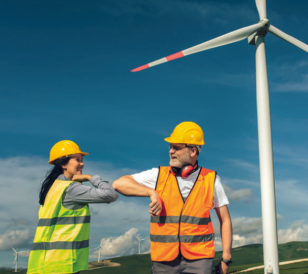Online Training Workshop on Guidelines and Best Practices in North Macedonia for MSMEs in delivering energy efficient products and in providing renewable energy equipment
Online Training Workshop on Guidelines and Best Practices in North Macedonia for MSMEs in delivering energy efficient products and in providing renewable energy equipment
February 18, 2021
On February 17 2021, UNDP and UNECE hosted an online training workshop where together with representatives of partner organizations, they presented a set of guidelines and best practices for MSMEs looking to delivering energy efficient products and in providing renewable energy equipment. Additionally, the workshop covered the "big picture" perspective on the impact of COVID-19 on MSMEs and its implications for investments into renewable energy and energy efficiency, as well as the role of MSMEs in supporting the county's green recovery and climate action commitments.
UNECE is one of the partners implementing UN Development Account project “Global Initiative towards post-Covid-19 resurgence of the MSME sector”. The overall goal of the project is to strengthen the capacity and resilience of micro-, small and medium enterprises (MSMEs) in developing countries and countries with economies in transition to mitigate the economic and social impact of the global Covid-19 crisis.
As part of its task under the project, UNECE developed Guidelines and Best Practices for Micro-, Small and Medium Enterprises in Delivering Energy-Efficient Products and in Providing Renewable Energy Equipment. North Macedonia is one of the pilot countries for which customized Guidelines and Best Practices have been developed (currently available in English and Macedonian). The report concludes that companies need to increase the utilization of various funds, programmes and preferential loans, extend their partnership and networking in order to overcome the issues of supply and product placement, reorganize their schedule and capabilities (through trainings), increase their outreach towards customers in a safe manner, and, when possible, try to pivot towards products that are in high demand due to the changed working environment.
UNDP’s Socioeconomic Assessment of COVID-19’s Impact in North Macedonia (interactive dashboard) confirmed that MSMEs are disproportionately affected by the pandemic. However, UNDP’s Report on the Benefits of Circular Economy on Mitigation of GHGs Emission in the Waste Sector and the analysis supporting the country’s Enhanced Nationally Determined Contributions show an opportunity for a green recovery. Implementing climate actions and introducing a circular economy model would not only lower GHG emissions but would also spur on low-carbon economic growth that could result in 10,589 new green jobs by 2030, at least 27% of which could be assigned to women by 2035. Energy efficiency activities, such as the retrofit of existing buildings and the construction of passive houses, are expected to be the dominant source of new green jobs, many of them in MSMEs.
The slides presented during the workshop are available for download on this page.

 Locations
Locations